Social Protection
Context
The State of the World’s Cash 2020 report found:
- Working with, through and alongside social protection systems is now considered key to strengthening the humanitarian-development nexus and humanitarians are increasingly active in this space
- Practitioners find that the three biggest challenges to effective linkages are: (i) lack of coordination between the actors involved, (ii) social protection systems are not designed to respond to crises, (iii) humanitarian practitioners lack expertise in social protection
- Critically, there is no ‘one size fits all’ solution to linking CVA and social protection. Trade-offs between efficiency, effectiveness, accountability, and sustainability must be considered to ensure the best outcomes for people living in crisis and depends on context, existing systems, and timeframe. Linking will not always be appropriate and social protection systems may not meet all needs. In many contexts, in the short to medium term at least, humanitarian programming will be required to fill gaps.
Current Priorities
The CALP Network has invested intensely in this thematic area over the last few years. We will continue to work closely with the SPIAC-B Working group on linking humanitarian (cash) assistance and social protection (formerly the Grand Bargain Sub-Workstream on Social Protection) and with the SocialProtection.org platform and the Online Community Social Protection in Crisis Contexts to develop evidence, produce capacity building materials and provide technical support to coordination actors.
Community of Practice
SocialProtection.org hosts a dynamic and collaborative online community of practice (CoP) bringing together individuals from diverse backgrounds interested in expanding social protection in crisis-prone areas. The CoP offers a space to exchange documents, insights, and news in order to progress and learn together. Its inclusive and member-led approach offers organisations and individual members a forum to increase learning and outreach, facilitating the exchange of experiences and expanding knowledge. A discussion group hosted by dgroups.org complements these activities by connecting users rapidly via email.
SPACE
There are a wealth of relevant resources from ‘Social Protection Approaches To Covid-19: Expert Advice’ (SPACE) published in the CALP library.
Featured content

Linking Social Protection and Humanitarian Cash and Voucher Assistance
Report
There is a growing momentum and body of work around the idea of developing stronger links between humanitarian cash and voucher assistance (CVA) and social protection (SP). This Briefing Paper for the CALP Network, based on a literature review, a survey, and interviews, is intended to inform the CALP Network’s overall approach in this area, and subsequently its capacity building and...

Linking Social Protection and Humanitarian Cash
Blog Post
The case for social protection to help people cope with shocks has always been clear and never more obvious than during the current Covid-19 crisis. These issues are currently playing out in real time as governments, donors and aid agencies scramble to find ways to get more help to more people to cope with the economic consequences of illness and lockdown. As the virus starts to take hold in...

Linking Social Protection and humanitarian cash and voucher assistance (CVA) – what do we really know and where to start? Findings from the CALP Network commissioned high level briefing paper at the time of COVID-19
Webinar
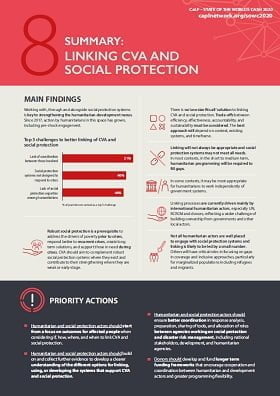
State of the World’s Cash 2020 Chapter 8 summary: Linking CVA and social protection
Report
Longstanding efforts to strengthen links between humanitarian CVA and social protection have been accelerated by the COVID-19 pandemic, with significant progress since the last report. CVA should aim to complement robust social protection systems where they exist and contribute to their strengthening where they are weak or early-stage. This chapter asks: ‘What opportunities and challenges...
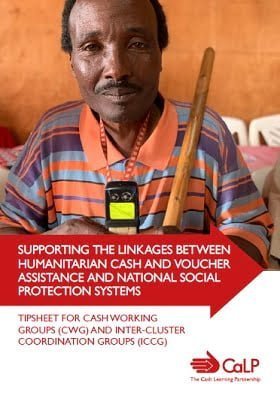
Supporting the Linkages Between Humanitarian Cash and Voucher Assistance and National Social Protection Systems
Report
This tipsheet aims to support country-level coordination efforts to strengthen the engagement between humanitarian coordination groups that implement cash and voucher assistance (CVA) and existing social
protection or disaster risk reduction coordination actors and groups. In particular, it seeks to offers inter-cluster and cash working group coordinators simple practical tips for engaging...
Case Studies

Linking CVA and Social Protection in the MENA Region – Crib sheet
Report
Building linkages between humanitarian cash and voucher assistance (CVA) and social protection (SP) has become an increasingly prominent topic over the past five years and the Middle East and North Africa (MENA) region has been at the centre of this evolution. The objective of this resource set (the crib sheet and 3, soon to be 6, regional case studies) is to ensure that the CALP Network...
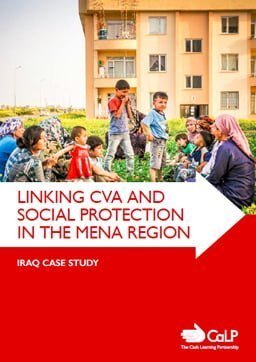
Linking CVA and Social Protection in the MENA Region – Iraq Case Study
Report
Building linkages between humanitarian cash and voucher assistance (CVA) and social protection (SP) has become an increasingly prominent topic over the past five years and the Middle East and North Africa (MENA) region has been at the centre of this evolution. The objective of this resource set (the crib sheet and 3, soon to be 6, regional case studies) is to ensure that the CALP Network...

Linking CVA and Social Protection in the MENA Region – Lebanon Case Study
Report
Building linkages between humanitarian cash and voucher assistance (CVA) and social protection (SP) has become an increasingly prominent topic over the past five years and the Middle East and North Africa (MENA) region has been at the centre of this evolution. The objective of this resource set (the crib sheet and 3, soon to be 6, regional case studies) is to ensure that the CALP Network...
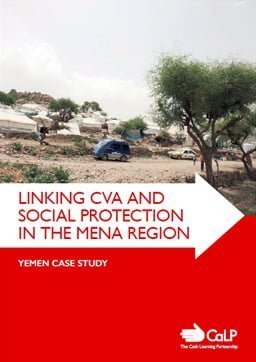
Linking CVA and Social Protection in the MENA Region – Yemen Case Study
Case Study
Building linkages between humanitarian cash and voucher assistance (CVA) and social protection (SP) has become an increasingly prominent topic over the past five years and the Middle East and North Africa (MENA) region has been at the centre of this evolution. The objective of this resource set (the crib sheet and 3, soon to be 6, regional case studies) is to ensure that the CALP Network...

Linking Cash and Voucher Assistance (CVA) and Social Protection – Occupied Palestinian Territories (OPT): Country Summary
Report
This country summary is part of a larger resource set, providing practitioners with examples of different approaches to linking CVA
and social protection.
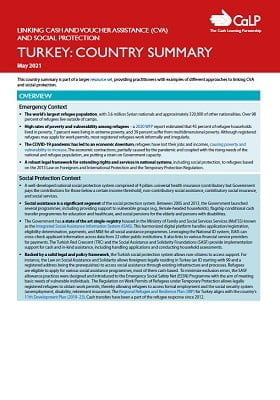
Linking Cash and Voucher Assistance (CVA) and Social Protection – Turkey: Country Summary
Report
This country summary is part of a larger resource set, providing practitioners with examples of different approaches to linking CVA
and social protection.
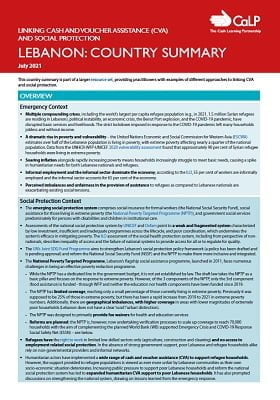
Linking Cash and Voucher Assistance (CVA) and Social Protection – Lebanon: Country Summary
Report
This country summary is part of a larger resource set, providing practitioners with examples of different approaches to linking CVA
and social protection.
Thematic lead
Latest

Social Accountability in the Delivery of Social Protection: Technical Guidance Note
Guidelines and Tools
How can citizens better hold social protection officials to account and ensure that they can understand their entitlements? Development Pathways’ research project on social accountability in social protection for the UK’s Department for International Development provides some answers. Social...

The Role of Cash Transfers in Social Protection, Humanitarian Response and Shock-Responsive Social Protection
Guidelines and Tools
Cash transfers have expanded rapidly in low- and middle-income countries (LMICs) around the world in the past decade. The contexts in which they are implemented have also diversified; while cash transfers were mostly adopted initially as central elements of social protection systems, they have become...

Social Protection and Humanitarian Response: What is the Scope for Integration?
Guidelines and Tools
Given the rise in humanitarian emergencies triggered by climate-related risks and conflict, often in contexts of chronic poverty and vulnerability, the international community is calling for the better integration of short-term humanitarian assistance and longer-term development interventions. In this...

Reflecting on the 2017 Drought Response and Cash Coordination in Kenya
Report
This report brings together thoughts and reflections on the use of cash in the drought response in Kenya in 2017/18 and consider how cash coordination might be strengthened in future. These are from a half day learning event organised by the CALP Network in liaison with the Chair and Co-Chair of the Kenya...
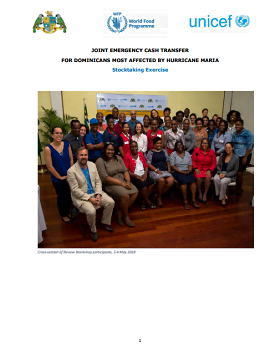
Joint Emergency Cash Transfer for Dominicans Most Affected by Hurricane Maria Stocktaking Exercise Report
Report
A workshop was organized in Roseau, Dominica on 3-4 May 2018, to bring together all the stakeholders involved at different levels and stages in the joint Emergency Cash Transfer programme that was implemented from December 2017 to March 2018 as part of the emergency response to Hurricane Maria. The report...
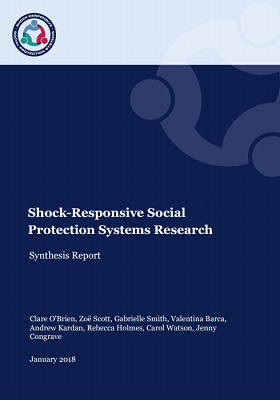
Shock Responsive Social Protection Systems Research: Synthesis Report
Report
This synthesis report consolidates the evidence and lessons learned from the research, drawing on all the case studies and other outputs, including the literature review as well as policy briefs on systems development and monitoring and evaluation. It highlights the key ways in which social protection...
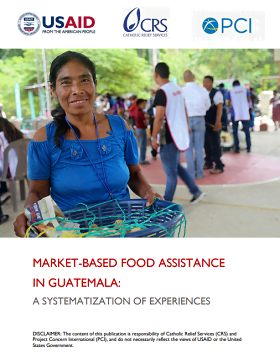
Market-based Food Assistance in Guatemala: A Systematization of Experiences
Guidelines and Tools
In April 2017, at the request of the United States Agency for International Development’s (USAID) Office of Food for Peace (FFP) in Guatemala, Catholic Relief Services (CRS) and Project Concern International (PCI) designed a process to gather and synthesize the experiences of food assistance...

Collected Papers on Gender and Cash Transfer Programmes in Humanitarian Contexts
Report
Existing gender inequalities mean that disasters and conflicts impact women, men, girls and boys differently. Cash based assistance is one of the most significant developments in humanitarian assistance in recent years. But the relationship between gender and cash based assistance in humanitarian contexts...
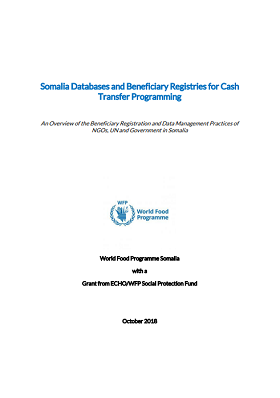
Somalia Databases and Beneficiary Registries for Cash Transfer Programming
Report
A report by WFP on Somalia Databases and Beneficiary Registries for Cash Transfer Programming. An ECHO-funded technical assistance facility, managed by the WFP, aims to explore how social protection systems can be strengthened in fragile and forced displacement contexts, with a view to contributing to the...
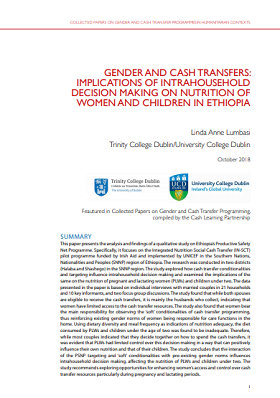
Gender and Cash Transfers: Implications of Intrahousehold Decision Making on Nutrition of Women and Children in Ethiopia
Case Study
From ‘Collected Papers on Gender and Cash Transfer Programmes in Humanitarian Contexts’. Existing gender inequalities mean that disasters and conflicts impact women, men, girls and boys differently. Cash-based assistance is one of the most significant developments in humanitarian assistance in recent...
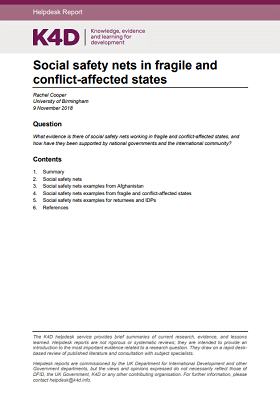
Social Safety Nets in Fragile and Conflict-Affected States
Report
This rapid review synthesises evidence on social safety net in fragile and conflict-affected states and how they have been supported by national governments and the international community. First section will discuss about the scope of social safety net and followed by examples from Afghanistan. Second...

Social Accountability in the Delivery of Social Protection
Report
This report pulls together a review of the global literature with findings from four country case studies to assess the effects that social accountability mechanisms have on the delivery of social protection services and on state-society relations.
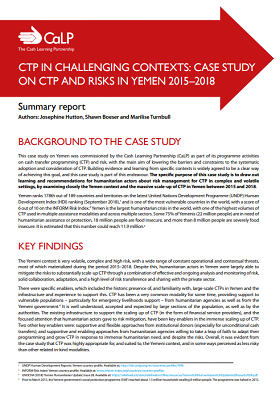
CTP in Challenging Contexts: Case Study on CTP and Risks in Yemen 2015–2018 – Summary
Report
Yemen is one of the most vulnerable countries in the world, and has long suffered from poverty, instability and vulnerability. The conflict, which has unravelled since late 2014, and, more specifically, since March 2015, has left 22 million Yemenis in need of some kind of humanitarian assistance or...
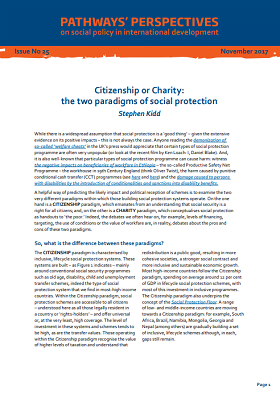
Citizenship or Charity: the two paradigms of social protection
Report
This report compares and evaluates two paradigms of social protection. Stephen Kidd explores the assumptions behind, and impacts of, the citizenship and charity paradigms he argues are at work in different contexts.

Terms of Reference – The Ethiopia Cash Working Group – November2017
Report
The Ethiopia Cash Working Group (ECWG) is a forum of stakeholders dedicated to improving the use and delivery of cash and voucher transfer programming in Ethiopia The overall objective of the group is to strengthen the coherence and quality of cash based interventions (CBIs) in Ethiopia through...

Final Evaluation of the DiRECT Response Emergency Cash Transfer Programme in Zambia
Report
In the past two years (2015 and 2016), Zambia experienced relatively harsh climatic conditions characterised by disruptive rains and the negative impact of El Nino weather patterns. Districts in the southern and western regions of the country were most affected. Many farmers in the affected regions were...
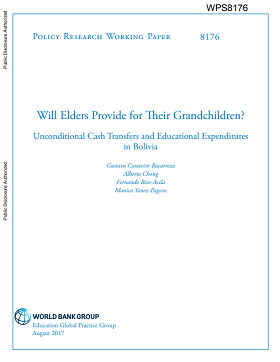
Will Elders Provide for Their Grandchildren? Unconditional Cash Transfers and Educational Expenditures in Bolivia
Report
This paper takes advantage of repeated cross-section household surveys and a sharp discontinuity created by the introduction of an unconditional cash transfers to elders.The paper evaluates the impact of these cash transfers on the educational expenditures for children within a household. The analysis...
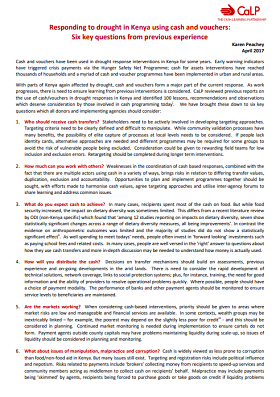
Responding to Drought in Kenya Using Cash and Vouchers: Six Key Questions from Previous Experience
Guidelines and Tools
the CALP Network reviewed previous reports on the use of cash/vouchers in drought responses in Kenya and identified 100 lessons, recommendations and observations which deserve consideration by those involved in cash programming today. We have brought these down to six key questions which all donors and...
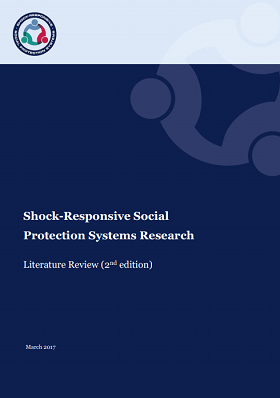
Shock-Responsive Social Protection Systems Research: Literature Review (2nd Edition)
Report
DFID has commissioned research into Shock-Responsive Social Protection systems, to further understand the nature of the interaction between social protection, humanitarian and disaster risk management systems and ways in which long-term social protection systems can be scaled up to provide support in...

Shock-Responsive Social Protection Systems Research Case Study: Pakistan
Report
This case study presents an overview of the social protection disaster risk management and humanitarian systems in Pakistan, and discusses both Pakistan’s flagship social protection programme, the Benazir Income Support Programme (BISP), as well as emergency cash transfers provided as disaster...

